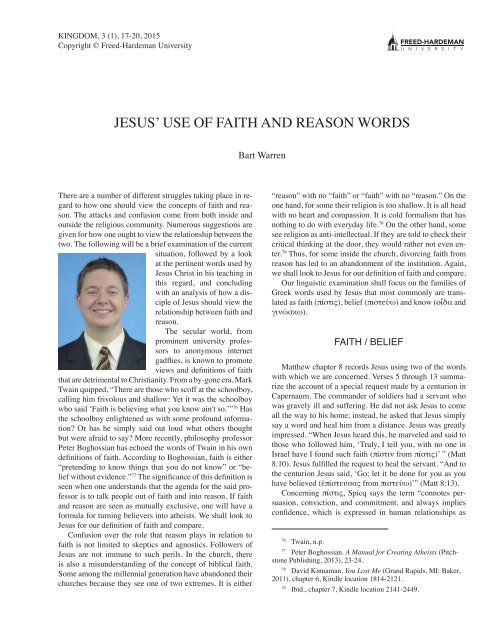kingdom-3-1
kingdom-3-1
kingdom-3-1
Create successful ePaper yourself
Turn your PDF publications into a flip-book with our unique Google optimized e-Paper software.
KINGDOM, 3 (1), 17-20, 2015<br />
Copyright © Freed-Hardeman University<br />
JESUS’ USE OF FAITH AND REASON WORDS<br />
Bart Warren<br />
There are a number of different struggles taking place in regard<br />
to how one should view the concepts of faith and reason.<br />
The attacks and confusion come from both inside and<br />
outside the religious community. Numerous suggestions are<br />
given for how one ought to view the relationship between the<br />
two. The following will be a brief examination of the current<br />
situation, followed by a look<br />
at the pertinent words used by<br />
Jesus Christ in his teaching in<br />
this regard, and concluding<br />
with an analysis of how a disciple<br />
of Jesus should view the<br />
relationship between faith and<br />
reason.<br />
The secular world, from<br />
prominent university professors<br />
to anonymous internet<br />
gadflies, is known to promote<br />
views and definitions of faith<br />
that are detrimental to Christianity. From a by-gone era, Mark<br />
Twain quipped, “There are those who scoff at the schoolboy,<br />
calling him frivolous and shallow: Yet it was the schoolboy<br />
who said ‘Faith is believing what you know ain't so.’” 76 Has<br />
the schoolboy enlightened us with some profound information?<br />
Or has he simply said out loud what others thought<br />
but were afraid to say? More recently, philosophy professor<br />
Peter Boghossian has echoed the words of Twain in his own<br />
definitions of faith. According to Boghossian, faith is either<br />
“pretending to know things that you do not know” or “belief<br />
without evidence.” 77 The significance of this definition is<br />
seen when one understands that the agenda for the said professor<br />
is to talk people out of faith and into reason. If faith<br />
and reason are seen as mutually exclusive, one will have a<br />
formula for turning believers into atheists. We shall look to<br />
Jesus for our definition of faith and compare.<br />
Confusion over the role that reason plays in relation to<br />
faith is not limited to skeptics and agnostics. Followers of<br />
Jesus are not immune to such perils. In the church, there<br />
is also a misunderstanding of the concept of biblical faith.<br />
Some among the millennial generation have abandoned their<br />
churches because they see one of two extremes. It is either<br />
“reason” with no “faith” or “faith” with no “reason.” On the<br />
one hand, for some their religion is too shallow. It is all head<br />
with no heart and compassion. It is cold formalism that has<br />
nothing to do with everyday life. 78 On the other hand, some<br />
see religion as anti-intellectual. If they are told to check their<br />
critical thinking at the door, they would rather not even enter.<br />
79 Thus, for some inside the church, divorcing faith from<br />
reason has led to an abandonment of the institution. Again,<br />
we shall look to Jesus for our definition of faith and compare.<br />
Our linguistic examination shall focus on the families of<br />
Greek words used by Jesus that most commonly are translated<br />
as faith (πίστις), belief (πιστεύω) and know (οἶδα and<br />
γινώσκω).<br />
FAITH / BELIEF<br />
Matthew chapter 8 records Jesus using two of the words<br />
with which we are concerned. Verses 5 through 13 summarize<br />
the account of a special request made by a centurion in<br />
Capernaum. The commander of soldiers had a servant who<br />
was gravely ill and suffering. He did not ask Jesus to come<br />
all the way to his home; instead, he asked that Jesus simply<br />
say a word and heal him from a distance. Jesus was greatly<br />
impressed. “When Jesus heard this, he marveled and said to<br />
those who followed him, ‘Truly, I tell you, with no one in<br />
Israel have I found such faith (πίστιν from πίστις)’ ” (Matt<br />
8:10). Jesus fulfilled the request to heal the servant. “And to<br />
the centurion Jesus said, ‘Go; let it be done for you as you<br />
have believed (ἐπίστευσας from πιστεύω)’” (Matt 8:13).<br />
Concerning πίστις, Spicq says the term “connotes persuasion,<br />
conviction, and commitment, and always implies<br />
confidence, which is expressed in human relationships as<br />
76<br />
Twain, n.p.<br />
77<br />
Peter Boghossian. A Manual for Creating Atheists (Pitchstone<br />
Publishing, 2013), 23-24.<br />
78<br />
David Kinnaman. You Lost Me (Grand Rapids, MI: Baker,<br />
2011), chapter 6, Kindle location 1814-2121.<br />
79<br />
Ibid., chapter 7, Kindle location 2141-2449.


